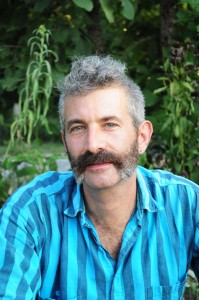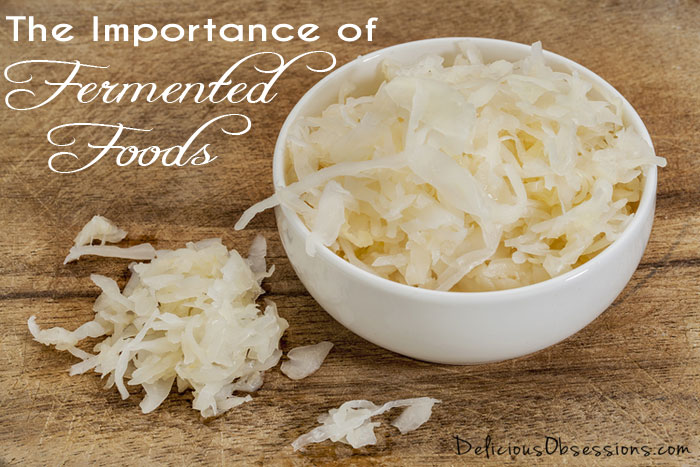FTC Disclosure: Delicious Obsessions may receive comissions from purchases made through links in this article. As an Amazon Associate I earn from qualifying purchases.Read our full terms and conditions here.
Many of you will remember that in 2012, I got serious about fermenting and started a new series called 52 Weeks of Bad A** Bacteria, where I featured a new ferment recipe or fermentation-related post each week in 2012. I ran into some set-backs in the fall of 2012, and I didn’t get to finish the full 52 weeks. I have not given up on fermenting, however, and do plan to continue with the series this year. I’ll be posting new recipes and also my experiences along the way.
Many of us learned to ferment from the book Nourishing Traditions. That’s where I was first introduced to the concept and soon after that, I found Sandor Katz’s book, Wild Fermentation completely hooked. I have been a fan ever since! 2012 brought some controversy in the fermenting world and really got us thinking about fermentation. I think the controversy was good, because it forced us to take a look at the information provided and make a decision. While there are going to be opinions all over the spectrum regarding the “proper” way to ferment, when it comes down to it, we all must do the best we can with the resources we have. I personally evaluated the information and came to a decision that best fit my needs. I encourage each and every one to do the same.
I am really excited about sharing this interview with you today. I have a lot of respect and admiration for Sandor and I was thrilled when he took the time to answer my questions.

So, who is Sandor Katz? If you’re not already familiar with him, let me fill you in. Sandor calls himself a “fermentation revivalist”. His interest in fermented foods grew out of an interest in cooking, gardening, and nutrition. Ferments have played a huge role in his life and he has a passion for sharing his love of ferments with others. Another reason that he is passionate about fermenting is because he has AIDS and he credits the power of fermented foods as a major part of his own healing journey (more proof that REAL food heals). He published the book Wild Fermentation in 2003 and has since taught hundreds of workshops on the subject across the U.S., as well as internationally. His focus is to take the fear out of fermentation and help people become comfortable with the process and find ways to incorporate it into their everyday lives. He frequently speaks at colleges, universities, farmers markets, bookstores, and various conferences, including ACRES USA and Weston A. Price Foundation. Learn more about Sandor here. Image Credit.
Without further adieu, here we go!
The Importance of Fermentation: An Interview with Sandor Katz
DO: In your book, “Wild Fermentation”, you refer to yourself as a having a fetish for ferments, so we know that fermenting is not just something you do, it’s part of who you are. Can you tell us a little about how you got started on your fermenting journey and what has led you to this point?
SK: I have always been drawn to the flavors of fermentation, and I loved pickles, sauerkraut, and some other fermented foods long before I started thinking about fermentation. The thing that got me to start fermenting in my home was starting to keep a garden. All of the cabbages were ready at the same time, so I had a practical reason to ferment: to preserve the harvest. As I became obsessed with fermentation, I started exploring how to ferment all sorts of different foods, and when I started teaching about fermentation for the first time, I got interested in allaying peoples’ irrational fears about the process and demystifying fermentation for people with a generalized fear of bacteria.
DO: Why is fermentation an important art for people to practice?
SK: Fermentation is an essential element of agriculture. Microorganisms are inevitably present on our food. If we do not prevent them from growing, or guide them in directions that make our food more stable, more digestible, or more delicious, they will decompose our food. Like all aspects of food production, fermentation—which has historically been practiced in households and communities everywhere—has largely disappeared behind factory doors. By participating in food production and fermentation, we reclaim our food and with it power, dignity, and a complex web of biological, social, and economic relationships.
DO: In the recent article on NPR, title “‘Fermentation’: When Food Goes Bad But Stays Good”, they talk about the fact that we eat fermented and cultured foods all the time without even realizing it (cheese, yogurt, beer, etc.). Yet, we still have many people who are afraid of fermented foods because there is a stigma around bacteria and that it is “dangerous”. How can we change that idea and encourage people to branch out on their fermented food journey and why is it important for people to become involved in their food production, rather than just relying on their grocery store to provide it for them?
SK: Yes, we must. Fermentation is not dangerous. To the contrary, it has been used as a strategy for safety. In fact, according to the U.S. Department of Agriculture, there has never been a single documented case of food poisoning from fermented vegetables in the United States. There aren’t too many foods you could say that about. The idea that bacteria are our enemies is a misguided notion. Bacteria in our bodies perform many essential physiological functions on our behalf, and we can improve our health by replenishing and diversifying them with bacterially rich live-culture foods and beverages.
DO: What motivates you to help others incorporate fermenting and fermented foods into their lives?
SK: Almost everyone’s favorite foods are products of fermentation. Ferments are among the most prized delicacies (and the most basic daily staples) all around the world. Yet because of our indoctrination to fear bacteria, many people are terrified to try fermenting foods and beverages at home. My interest is in empowering people to get over their fears and learn the basic concepts for effective and safe home fermentation, so anyone can start a home fermentation practice.
DO: When it comes to topics like real food, traditional foods, fermented foods, etc., it really does take a village. Changing the mindset of a culture that has been brainwashed as to what constitutes good nutrition is no easy feat. What are your ideas on how we can accomplish this?
SK: We can’t necessarily change the culture all at once, but by sharing these foods, sharing our passion, and sharing skills we can create change. We have to be determined, persistent, and creative. Change is happening, and the more catalysts we have the faster it can happen.
DO: You’ve written three books, including one that was just recently released, The Art of Fermentation. Can you tell us a little about your inspiration for your newest book?
SK: My first book on fermentation, Wild Fermentation, opened many doors and created the opportunity to interact with many accomplished and aspiring fermenters. As a result, I have had the privilege to hear a lot of wonderful stories, and taste many homemade and artisan-fermented concoctions. Many readers of my books, visitors to my website, and participants in my workshops have recounted tales of their grandparents’ fermentation practices; immigrants have excitedly told me about ferments from the old country, often lost to them through migration; travelers have reported on ferments they have encountered; people have divulged their quirky family variations; and other experimentalists such as myself have shared their adventures. I have also fielded thousands of troubleshooting questions, causing me to research and think about many more aspects of the inevitable variations that occur in home fermentations. The Art of Fermentation is a compendium of the fermentation wisdom I have collected.
DO: There has been a lot of information circulating the Web on the “right” way to ferment. This is exceptionally confusing and overwhelming, not only for experienced fermenters, but to people who are just becoming acquainted with fermenting. What are some tips that you could offer them?
SK: There is no single vessel or method for a natural phenomenon that has evolved as an important culinary practice all around the world. Keep your eyes open, notice variations in technique, and be bold in your experimentation. But don’t let anybody tell you there is only one way to do anything.
DO: Where do you see the real food / traditional foods / fermented food revolution in 20 years and what can we do today to ensure that it continues to grow in strength?
SK: Unfortunately I cannot see into the future. I definitely see the movement to reclaim our food growing, but so is the concentration of agriculture, food processing, distribution, and retailing. Policies supportive of real food in our schools are critical points of intervention. Become part of the movement to reclaim our food, and share your passion (and your products) with your friends.
DO: How many ferments do you have brewing right now?
SK: Radish kraut, several different misos, several different wines and meads, and sourdough. I think that’s all I have actively going at present.
DO: Of all of the ferments you have made, do you have any that are especially aged? If so, how old?
SK: I have wines that are a decade old and misos dating back 3 years.
DO: What is the strangest thing you’ve ever fermented?
SK: The ferments that have made other people most squeamish have definitely been fish and meat ferments. But they have all been delicious and tender, and not very strange at all, in my opinion.
DO: If you could only make and eat one fermented food for the rest of your life, what would it be?
SK: I would hate to be forced to make a decision like that, but I guess it would be sauerkraut.
DO: Are you open to sharing what a typical day in the life of Sandor Katz is like?
SK: I spend nearly half my time traveling so I don’t even know what a typical day is like. I like to start my day with a short solo yoga practice. I drink pu-er (fermented) tea. I like to eat a hearty breakfast, often savory vegetable sourdough pancakes. I like to spend as much time as I can working in my garden. These days I spend a couple of hours a day answering emails. I like to cook. I like to go for walks. I like to spend time with friends. I like to read. I like to play games. But the sequencing of these activities varies because I teach and travel so much, and also I am restoring an old log cabin which will become my fermentation school.
DO: What is the number 1 tip you could give a new fermenter? What do you wish you had known when you started that you know now?
SK: Do not be afraid. Fermentations have always been used as strategies for safety, and at least in the realm of raw plant-based ferments, there is no reported case history of illness resulting from them.
You can learn more about Sandor on his website or his Facebook page. You can also find his books, Wild Fermentation, here and his newest book, The Art of Fermentation here.


6 Comments